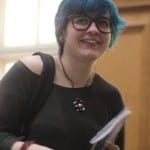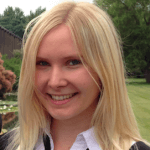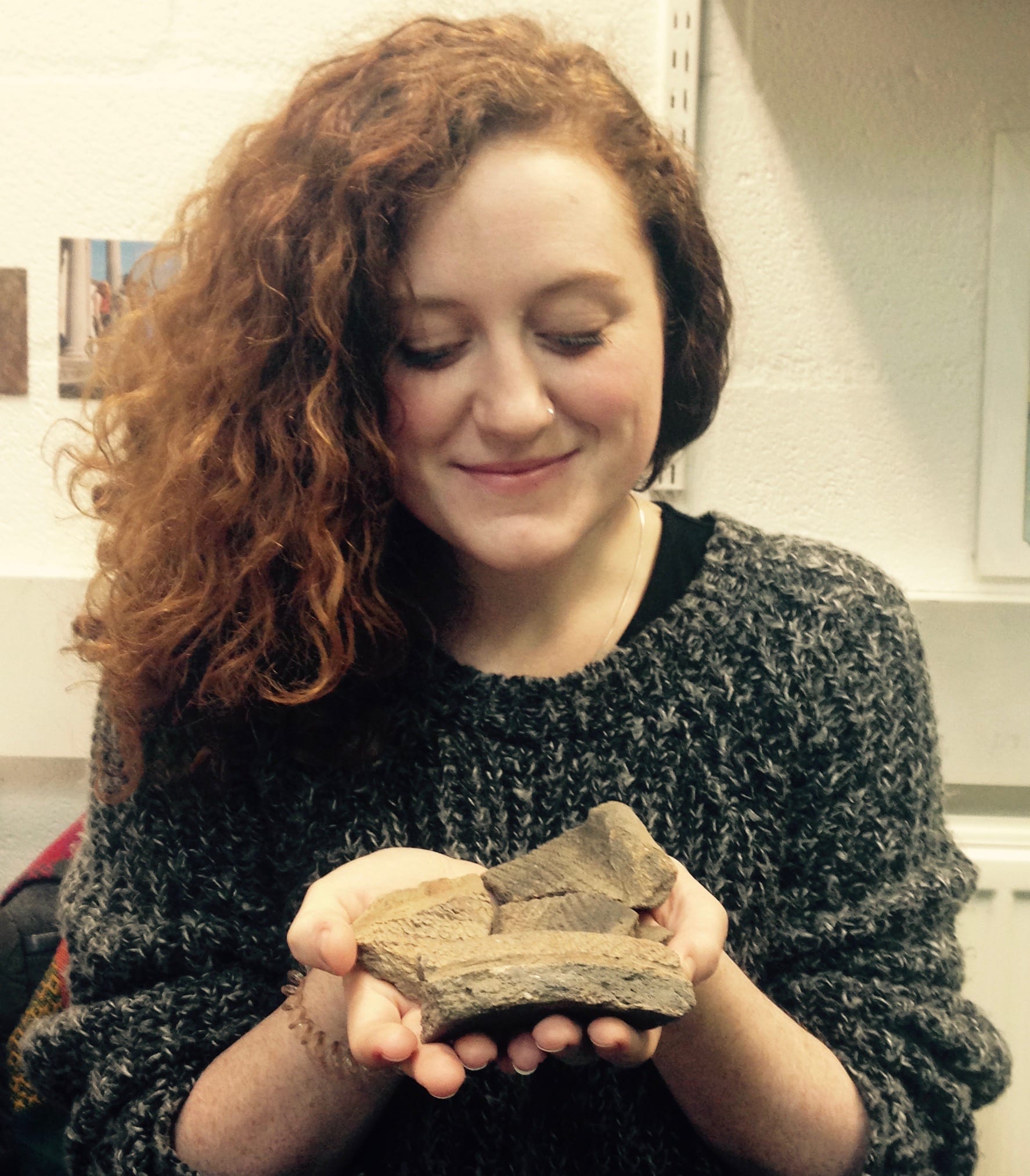Meet the Team
There are currently 15 UCL researchers in our Postgraduate Student Engagement team, whose profiles are listed below. For previous team members, see our Researchers in Museums Alumni page.
Team Coordinator
Arendse Lund
UCL Department of English
 For my dissertation, “Law as Literature in the Vernacular Codes of Anglo-Saxon England,” I track the development of legal language specific to Old English. I particularly examine how the Anglo-Saxon kings used legal diction to influence perceptions of their authority and how this same language later appears in literature.
For my dissertation, “Law as Literature in the Vernacular Codes of Anglo-Saxon England,” I track the development of legal language specific to Old English. I particularly examine how the Anglo-Saxon kings used legal diction to influence perceptions of their authority and how this same language later appears in literature.
Follow her on Twitter: @arendse
Read Arendse’s blog posts.
Engagement Team
Cerys Bradley
UCL Department of Security & Crime Science
 I am a PhD student in the Crime and Security Science Department, a multidisciplinary research group that applies all areas of science to modern crime problems. I use my background in mathematics, combined with crime science, to investigate Dark Net Markets (DNMs) (websites in the Dark Web that facilitate the sale of illegal goods).
I am a PhD student in the Crime and Security Science Department, a multidisciplinary research group that applies all areas of science to modern crime problems. I use my background in mathematics, combined with crime science, to investigate Dark Net Markets (DNMs) (websites in the Dark Web that facilitate the sale of illegal goods).
Follow Cerys on Twitter: .@hashtagcerys
Read Cerys’s blog posts.
Julia Deathridge
MRC Laboratory of Molecular Cell Biology
Stem cells have the capability to develop into many different cell types in the body as their cell fate is yet to be determined. It has become apparent that under culture conditions not all stem cells in a population will be in a uniform state and a situation arises in which some cells will be primed for development, whilst others remain in a stem-like state known as ‘Naive pluripotency’. However, what is causing this heterogeneous population is still unclear. My PhD project is looking at the mechanisms that could be regulating this variation in state between stem cells of the same population and whether once a cell has been primed for development is it possible for it to return back to its Naive state.
Kyle Lee-Crossett
UCL Institute of Archaeology
 My research investigates the impact of collecting bio-and cultural diversity on the access to and management of archive and museum collections in London. I use qualitative methods like ethnography and discourse analysis to examine how people and materials enter collections and who or what gets stuck or is considered difficult to include. My research also explores how people working in collection form goals and aspirations about diversity and access in the heritage sector. My PhD is part of the Heritage Futures research project, which compares how different conservation disciplines create and shape future legacies in their work.
My research investigates the impact of collecting bio-and cultural diversity on the access to and management of archive and museum collections in London. I use qualitative methods like ethnography and discourse analysis to examine how people and materials enter collections and who or what gets stuck or is considered difficult to include. My research also explores how people working in collection form goals and aspirations about diversity and access in the heritage sector. My PhD is part of the Heritage Futures research project, which compares how different conservation disciplines create and shape future legacies in their work.
Read Kyle’s blog posts.
Josie Mills
UCL Institute of Archaeology
My research is focused on exploring how the Neanderthals of the English Channel region collected flint raw material to make stone tools and what understanding these processes of acquisition can tell us about human behaviour in the Middle Palaeolithic. During my first year of research I have trialled the use of portable x-ray fluorescence to establish the geochemistry of flint artefacts with the aim of linking them back to a geological area, thus estimating a distance travelled from source to site. Continuing work will involve other profiling techniques such as mass-spectrometry and experimental work on flint itself to further test the validity of this provenancing method.
Read Josie’s blog posts.
Catie Williams
BBSRC London Interdisciplinary Doctoral Programme
 My research is on the evolution of gut bacteria in primates. Specifically, we are looking at the factors that affect which gut bacteria a primate will have, including primate species, diet, and social behaviour. We are also looking into how life in captivity affects the gut microbiota by comparing wild and captive animals of the same species.
My research is on the evolution of gut bacteria in primates. Specifically, we are looking at the factors that affect which gut bacteria a primate will have, including primate species, diet, and social behaviour. We are also looking into how life in captivity affects the gut microbiota by comparing wild and captive animals of the same species.
Hannah Wills
Science and Technology Studies
 My PhD is a Collaborative Doctoral Award with UCL and the Royal Society, on the topic of ‘Charles Blagden and Banksian Science, 1770-1820’. My project involves the transcription and interpretation of the diary of Charles Blagden, secretary to the Royal Society from 1784 to 1797, under the presidency of Joseph Banks. I am particularly interested in Blagden’s role as a ‘go-between’, and how he brokered scientific information and objects between individuals and communities, both in London and abroad.
My PhD is a Collaborative Doctoral Award with UCL and the Royal Society, on the topic of ‘Charles Blagden and Banksian Science, 1770-1820’. My project involves the transcription and interpretation of the diary of Charles Blagden, secretary to the Royal Society from 1784 to 1797, under the presidency of Joseph Banks. I am particularly interested in Blagden’s role as a ‘go-between’, and how he brokered scientific information and objects between individuals and communities, both in London and abroad.
Read Hannah’s blog posts.
Alexandra Bridarolli:
SEAHA & Eastman Dental Institute
 I am a 2nd year PhD student at Eastman Dental Institute at UCL in London and part of SEAHA, the centre for doctoral training in Science and Engineering in Arts, Heritage and Archaeology.
I am a 2nd year PhD student at Eastman Dental Institute at UCL in London and part of SEAHA, the centre for doctoral training in Science and Engineering in Arts, Heritage and Archaeology.
My current research explores the use of innovative nanoparticles of cellulose for the consolidation of the canvas of modern paintings. These treatments could offer an alternative to current practices and materials in use in conservation which are known to put paintings at risks. This research greatly benefits from a close collaboration with painting conservators across Europe.
Mark Kearney
SEAHA CDT – Institute of Sustainable Heritage

I am a 2nd year PhD student based at the SEAHA CDT in the Institute of Sustainable Heritage. My research is concerned with the decay of plastic objects of art and design.Contrary to popular belief, many plastics do not last forever, with some suffering rapid and often catastrophic decay patterns within the first 20 – 50 years of acquisition. As plastics have been one of the most important materials of the modern era, they now form central parts of museum’s collections.
Anna Pokorska
SEAHA CDT – Institute of Sustainable Heritage
 I am a second year PhD student at the Institute for Sustainable Heritage and SEAHA-CDT (Science and Engineering in Arts, Heritage and Archaeology Centre for Doctoral Training). My research project is focused on the stability of modern synthetic and semi-synthetic materials to visible light and is carried out at in association with the V&A museum and Philips.
I am a second year PhD student at the Institute for Sustainable Heritage and SEAHA-CDT (Science and Engineering in Arts, Heritage and Archaeology Centre for Doctoral Training). My research project is focused on the stability of modern synthetic and semi-synthetic materials to visible light and is carried out at in association with the V&A museum and Philips.
Hannah Page
Archaeology Department

I am a fourth year part-time PhD student in the Archaeology department. My thesis focuses on sociocultural and political organisation and change in the early 2nd millennium AD in Uganda. My research
aims to reconstruct key aspects of life at the site of Ntuusi through the detailed archaeometric (scientific) analysis of pottery. This type of ceramic analysis can be used to understand scale and organisation of production practices, identify cultural groups and understand networks of local and long-distance trade and exchange. I am also active in running excavations and coordinating field schools and outreach events in the UK and sub-saharan Africa.
Sarah Gibbs
UCL English Department
 I completed an MA in English at Queen’s University and a Master of Library and Information Studies (MLIS) degree at McGill University in Canada. My doctoral dissertation at UCL focuses on George Orwell’s epistemology. My research combines concepts and methodologies from literary scholarship, philosophy, and library and information studies to discern how the ‘Tory-Anarchist-Turned-Socialist’ author of Nineteen Eighty-Four conceived of the relationship between knowledge and power, and what tools his epistemology offers to address current political realities.
I completed an MA in English at Queen’s University and a Master of Library and Information Studies (MLIS) degree at McGill University in Canada. My doctoral dissertation at UCL focuses on George Orwell’s epistemology. My research combines concepts and methodologies from literary scholarship, philosophy, and library and information studies to discern how the ‘Tory-Anarchist-Turned-Socialist’ author of Nineteen Eighty-Four conceived of the relationship between knowledge and power, and what tools his epistemology offers to address current political realities.
Cerys Jones
SEAHA CDT – Institute of Sustainable Heritage
 Multispectral imaging involves capturing images of an object illuminated in ultraviolet, visible and infrared light, in order to reveal features, such as faded text and underdrawings, that cannot be seen by the naked eye. My PhD research will optimise the workflow of multispectral imaging of heritage artefacts to enable heritage practitioners to capture and process images of their own collections without the need for a specialist imaging scientist.
Multispectral imaging involves capturing images of an object illuminated in ultraviolet, visible and infrared light, in order to reveal features, such as faded text and underdrawings, that cannot be seen by the naked eye. My PhD research will optimise the workflow of multispectral imaging of heritage artefacts to enable heritage practitioners to capture and process images of their own collections without the need for a specialist imaging scientist.
Carolyn Thompson
Institute of Zoology, London
 I am a PhD student studying the patterns and drivers of gibbon decline in China and Myanmar. Gibbons are the smallest of the apes known for their ability to sing and move gracefully through the trees. Nineteen of the twenty known species are on the brink of extinction, yet in the shadow of their great ape cousins, gibbons receive less funding and research attention. I currently focus on two species threatened by habitat loss and hunting: the Hainan gibbon, which is the rarest primate in the world with only 26 individuals, and the newly discovered Skywalker Hoolock gibbon with only 200 individuals remaining.
I am a PhD student studying the patterns and drivers of gibbon decline in China and Myanmar. Gibbons are the smallest of the apes known for their ability to sing and move gracefully through the trees. Nineteen of the twenty known species are on the brink of extinction, yet in the shadow of their great ape cousins, gibbons receive less funding and research attention. I currently focus on two species threatened by habitat loss and hunting: the Hainan gibbon, which is the rarest primate in the world with only 26 individuals, and the newly discovered Skywalker Hoolock gibbon with only 200 individuals remaining.
Jen Datiles
UCL School of Pharmacy
I am a PhD student at the UCL School of Pharmacy studying food and medicinal plants that were exchanged between Asia and the Americas via the Spanish Galleon Trade (1565-1815). Using selected plant species as case studies, my research aims to link historical documentation with modern use-knowledge of traditional food-medicines through fieldwork and work in various archives and herbaria.
 Close
Close


